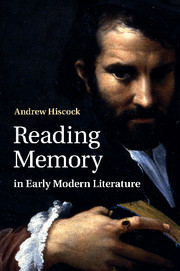Book contents
- Frontmatter
- Contents
- Figures
- Acknowledgements
- Introduction: ‘the dark backward and abysm of time’
- Chapter 1 ‘To seke the place where I my self hadd lost’: acts of memory in the poetry of Henry Howard, Earl of Surrey
- Chapter 2 ‘Remembre not (lorde) myne offences’: Katherine Parr and the politics of recollection
- Chapter 3 ‘Better a few things well pondered, than to trouble the memory with too much’: troubling memory and martyr in Foxe’s Acts and Monuments
- Chapter 4 Text, recollection and Elizabethan Fiction: Nashe, Deloney, Gascoigne
- Chapter 5 The Doleful Clorinda? Mary Sidney, Countess of Pembroke, and the vocation of memory
- Chapter 6 ‘Tell me where all past yeares are’: John Donne and the obligations of memory
- Chapter 7 ‘Of all the powers of the mind … the most delicate and fraile’: the poetry of Ben Jonson and the renewal of memory
- Chapter 8 ‘This art of memory’: Francis Bacon, memory and the discourses of power
- Notes
- Select Bibliography
- Index
Chapter 5 - The Doleful Clorinda? Mary Sidney, Countess of Pembroke, and the vocation of memory
Published online by Cambridge University Press: 05 April 2014
- Frontmatter
- Contents
- Figures
- Acknowledgements
- Introduction: ‘the dark backward and abysm of time’
- Chapter 1 ‘To seke the place where I my self hadd lost’: acts of memory in the poetry of Henry Howard, Earl of Surrey
- Chapter 2 ‘Remembre not (lorde) myne offences’: Katherine Parr and the politics of recollection
- Chapter 3 ‘Better a few things well pondered, than to trouble the memory with too much’: troubling memory and martyr in Foxe’s Acts and Monuments
- Chapter 4 Text, recollection and Elizabethan Fiction: Nashe, Deloney, Gascoigne
- Chapter 5 The Doleful Clorinda? Mary Sidney, Countess of Pembroke, and the vocation of memory
- Chapter 6 ‘Tell me where all past yeares are’: John Donne and the obligations of memory
- Chapter 7 ‘Of all the powers of the mind … the most delicate and fraile’: the poetry of Ben Jonson and the renewal of memory
- Chapter 8 ‘This art of memory’: Francis Bacon, memory and the discourses of power
- Notes
- Select Bibliography
- Index
Summary
For what is it that enables us to remember, or what character has it, or what is its origin?
Cicero, Tusculan Disputations, i.xxiv.59But lett your Ladyship take what course yt shall please you with me, this shalbee myne with you [that] you may repent you of so many ill spent yeares of so vaine a book and that you may redeeme the tym with writing as large a volume of heavenly layes and holy love as you have of lascivious tales and amorous toyes that at the last you may followe the rare, and pious example of your vertuous and learned Aunt, who translated so many godly books and especially the holly psalmes of David, that no doubt now shee sings in the quier of Heaven those devine meditations which shee so sweetly tuned heer belowe, and which being left to us heer on earth will begett hir dayly more and more glory in heaven as others by [them] shalbe enlightened, who as so many trophies shall appeare to her further exaltation in gods favour, with which prayer for you I end and rest
Your most wellwishing frend
Edward DennyWhile much has been made critically of the ways in which writers such as Katherine Philips in the second half of the seventeenth century were held up to succeeding generations of women as potential role models for female engagement with print culture, the processes of cultural remembering surrounding Mary Sidney, Countess of Pembroke, are equally instructive in their insights into early modern society’s relations with its (textual) pasts. The extract above concludes a vigorous letter of complaint to Pembroke’s niece, Lady Mary Wroth, from Sir Edward Denny, who believed that he had been satirised (as appears to have been the case) in Wroth’s prose romance The Countess of Montgomery’s Urania (1621). On its title page, Urania proclaims itself to be written by the ‘neece to the ever famous, and renowned Sr. Phillips Sidney knight. And to the most exele[n]t Lady Mary Countesse of Pembroke late deceased’, and indeed many critics have speculated that Pembroke herself is figured forth in the prose romance as the Queen of Naples. Nonetheless, the ranting Denny insists that if Wroth must violate cultural proprieties by taking up the pen in the first place, then she should acknowledge the full weight of her Sidneian past and be controlled (rather than empowered) by the ‘pious example’ of her aunt. However, there remain intriguing questions surrounding Pembroke’s own participation in the ongoing Tudor commitment to the textual projects of imitatio, memorialisation and heroic narrative.
- Type
- Chapter
- Information
- Reading Memory in Early Modern Literature , pp. 138 - 164Publisher: Cambridge University PressPrint publication year: 2011

